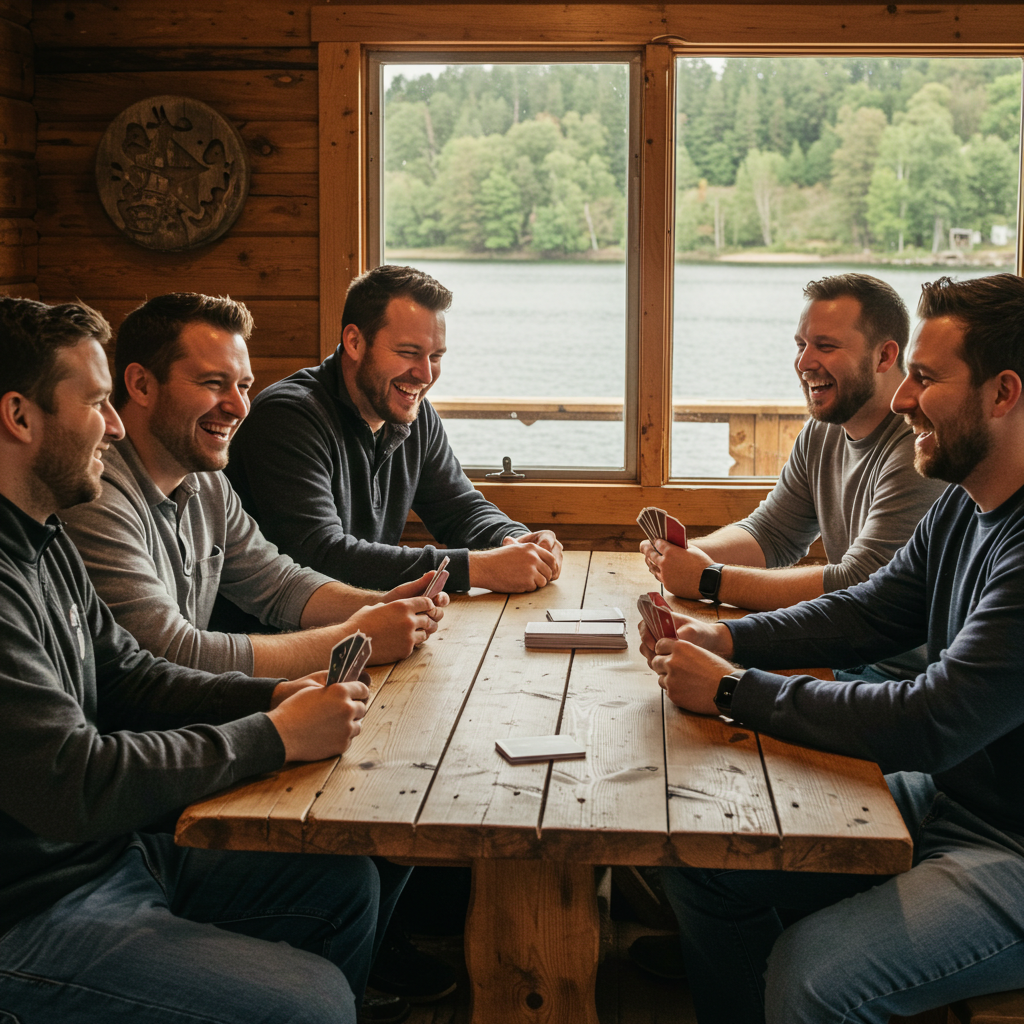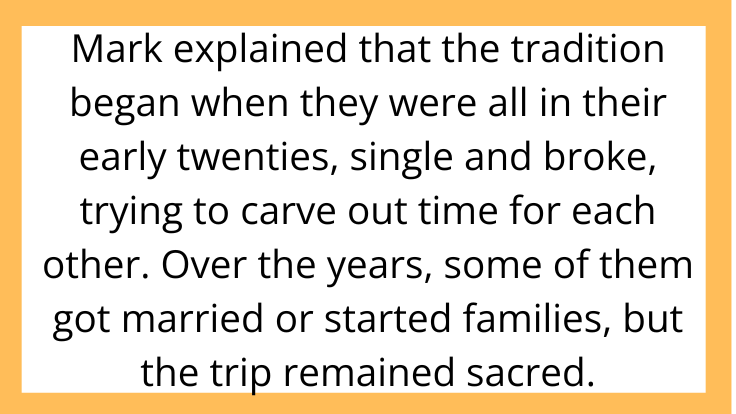AITAH for Not Letting My Best Friend’s Girlfriend Join Our Annual Guys’ Trip?
Every year, a group of longtime friends sets aside a weekend to reconnect, reminisce, and enjoy a little time away from the pressures of daily life. But what happens when one person’s new relationship challenges the tradition?
Today’s AITAH scenario digs into loyalty, boundaries, and whether exclusivity is the same thing as exclusion.
The Backstory: A Tradition Years in the Making

Our storyteller—let’s call him Mark—is a 32-year-old who has been taking an annual guys’ trip with four of his closest friends for nearly a decade. Each year, they pick a different destination—sometimes it’s hiking, sometimes it’s a cabin by the lake—and spend three days catching up, playing cards, and decompressing.
Mark explained that the tradition began when they were all in their early twenties, single and broke, trying to carve out time for each other. Over the years, some of them got married or started families, but the trip remained sacred.
“No partners, no kids,” Mark wrote on Reddit. “It’s the only time all year we’re just us.”
The Twist: A New Relationship Challenges Old Boundaries

This year, one of the friends—Chris—started dating a woman named Jenna. They’ve been together for about six months, and things have gotten serious quickly.
When the group began planning this year’s trip to a mountain lodge, Chris casually mentioned he was thinking about bringing Jenna along.
Mark and the others reminded him of the tradition: no partners. Chris argued that Jenna wouldn’t “get in the way,” that she loved hiking and would sleep in a separate room, and that excluding her felt unfair.
Mark told him kindly but firmly that the trip was for the guys only. Chris accused him of gatekeeping, of being “weirdly possessive” about the group, and of not respecting that Jenna is now a big part of his life.
Chris ultimately said he might skip the trip if Jenna wasn’t welcome.
Mark turned to the internet: AITAH for not inviting my friend’s girlfriend on our guys’ weekend?
Tradition vs. Change: When Is Inclusion Necessary?

Why Mark Might Not Be the Villain
Many commenters on r/AITAH sided with Mark. They argued that:
-
Group traditions matter. Preserving a once-a-year ritual doesn’t make you controlling.
-
Everyone agreed to the ground rules. No partners meant no partners, period.
-
It’s about dynamics, not disrespect. Even if Jenna is perfectly nice, her presence would change the energy.
One commenter put it this way:
“You’re not saying she’s unwelcome forever—you’re just maintaining the one space you have for yourselves.”
Why Chris Feels Hurt
On the other hand, it’s easy to see why Chris felt slighted:
-
He wants to integrate his partner. New relationships often come with a desire to share every part of life.
-
He may feel caught between loyalty to Jenna and loyalty to the group.
-
He may interpret the “no partners” rule as a rejection of her as a person.
Still, most agreed that this wasn’t about Jenna personally—it was about keeping the group dynamic intact.
The Deeper Issue: What Are Traditions For?

Group traditions exist to create connection and preserve bonds. But as people grow, marry, and build new families, those traditions often clash with new commitments.
Some groups adapt: partners join, kids are invited, and the original shape of the ritual changes.
Others hold firm, believing that if everything becomes a “plus one” event, nothing feels special anymore.
There’s no universal right answer—but what matters most is clarity and respect.
What Could Mark and Chris Have Done Differently?

To prevent resentment and misunderstanding, Mark and Chris could have:
-
Had an honest conversation early. Mark could have explained why the group prefers the trip to be just them—and asked if Chris was still comfortable.
-
Acknowledged the change in Chris’s life. Instead of framing Jenna as an intruder, they could have discussed whether this rule should evolve as the group evolves.
-
Created space for inclusion elsewhere. Maybe a second trip or a couples’ weekend to balance things out.
Takeaway: Boundaries Are Not Automatically Exclusion

It’s possible to respect your friend’s relationship while still saying, “This is something I’d like to keep just for us.”
That doesn’t make you possessive or petty. It makes you someone who values tradition and wants to honor a long-standing commitment.
Chris has every right to decline the trip if it doesn’t fit his current priorities—but Mark has every right to maintain the event as it’s always been.



